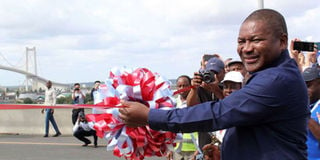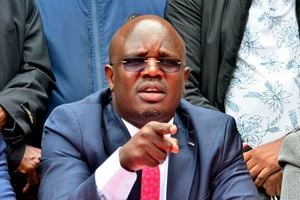
Mozambique's President Filipe Nyusi officially inaugurates the Maputo-Katembe bridge on November 11, 2018 in Maputo, Mozambique.
Mozambique thought it had ended the war with a peace deal in 1992. It flared up again in 2013. Another deal in 2019 seemed to have settled it. But by then the country was dealing with something else, a threat to the entire nation in the form of an insurgency.
These ups and downs have been part and parcel of the southern African country for the past four decades. But President Filipe Nyusi, who steps down in January next year, could see these fluctuations in the country's peace as part of his legacy.
"We have not yet been able to completely and definitively eliminate terrorism in northern Mozambique," he told the country in a televised speech last week as part of events to review his legacy.
“But we have managed to contain and push back these actions.”
Terrorism, or insurgency, has technically been his headache in his second and final term.
A group known as al-Shabaab (with no known links to the Somali militant group of the same name) nearly paralysed the north of the country, forcing the suspension of some economic activities such as oil and gas exploration.
Until Mozambique reached out to the continent: Rwandan troops were the first to arrive to fight alongside local forces.
Then Mozambique took in troops from the Southern African Development Community. They bolstered the country's response, allowing civilians to resume a relatively normal life.
Nyusi probably didn't expect the rebellion to disrupt his work.
During his presidency, the Peace and National Reconciliation Agreement was signed on 6 August 2019, providing for the disarmament and demobilisation of former Renamo fighters.
Officially, the government says this has been completed and that Renamo now operates only as a mainstream political party.
But Mozambique hasn't always known peace. The country's civil war ended with the General Peace Agreement signed in Rome on 4 October 1992 by former president Joaquim Chissano and Afonso Dhlakama, the founder of Renamo. It lasted more than 20 years.
For 39 years, Renamo fought a 16-year war against the ruling Frelimo party until 1992, when it emerged as an opposition party.
In 2013, the country was plunged back into chaos after the government attacked a Renamo military base.
Some observers say this was exploited by extremists in the north of the country in 2017, giving rise to the insurgency.
In June 2023, diplomats from several countries witnessed the closure of the last opposition military base.
But the end of Nyusi's term will signal the passing of the baton to the next president, who will be elected on October 9 but take office in January.
Nyusi took office in 2015 and was elected for a second term. Mozambique has a two-term limit for presidents.
Just two years into his first term, insurgents began attacking police stations in the district of Mocimboa da Praia and then spread to other districts in the northern part of Cabo Delgado, notably Macomia, Palma and Nangade.
So far, both the African Union and the regional bloc, the Southern African Development Community (SADC), have expressed concern about the insurgency in Mozambique.
Last month, British charity Save the Children said an escalation of violence in Cabo Delgado was driving up cases of early and forced marriage, with girls abducted and forced into marriages by armed groups or families seeking a dowry.
UN agencies say more than 70,000 people have been displaced since the latest outbreak of violence in February, bringing the total number of people displaced by the insurgency to around 1 million.
The US Department of State puts the figure of fatalities at 1,300 civilians.
Nyusi insisted in his speech that he would leave office "with a sense of mission accomplished, having handed over this reconciled country".
But the country will still have to deal with an insurgency that has almost torn the country in two, and which the president hasn't been able to declare defeated.
The reconciliation may have been a success but even he admits conditions that pushed fighters into the bush may recur in future, and may be fueling insurgents.
According to government data, around 3,700 of the 5,200 former Renamo fighters who moved to civilian life as part of the Peace process are already receiving their pensions.
Francisco Massango, a political analyst in the capital Maputo said the insurgency is a smaller threat to the war of the past.
“President Nyusi saved the country from a major crisis,” Massango told the Nation on Thursday, August 15.
On the same day as President Nyusi's speech in parliament, a scandal broke out that left commentators worried about the country's security.
Last week, the Central Office for Fighting Corruption (GCCC) filed three cases involving five senior officials from the Ministry of National Defence, charging them with embezzling more than Meticais 52 Million ($814,303).
The GCCC is an agency under the Attorney General's Office. That case may, however, be the can of the next President to carry.
When Nyusi took office, there were high hopes that the former defence minister would bring back peace to the country, Carlos Paca, an international relations expert and political commentator told the Nation in Luanda, Angola.
“Even with the international support he [President Nyusi] has not managed to win,” Paca made the assessment, referring to the danger the insurgency has brought the country.
“Nyusi served as the Minister of Defence from 2008 to 2014 under President Armando Guebuza, but during his presidency, the country's security was one of the weakest departments,” Mr Paca added.
Rwandan and SADC troops have not totally succeeded in ending the insurgency, he argued. The US, France, Portugal, and Russia, through the short-lived deployment of Wagner troops, are among others who also supported Nyusi´s administration to tame insurgency.
For José Manteigas, Renamo's spokesman argued northern Mozambique has also been a hunting ground for corrupt government officials, especially in the military.
“There's a lot of talk that the war in Cabo Delgado has managed to have big tentacles because it's also an environment in which high-ranking members of the Defence and Security Forces are getting rich,” he told Nation, suggesting there has been a deliberate exaggeration of the situation to attract funding for the corrupt to steal.
Despite the criticism, the ruling Frelimo party, which has ruled Mozambique since the country gained independence from Portugal in 1975, said this week that Nyusi had played a good role in the country’s peace, development and unity.










